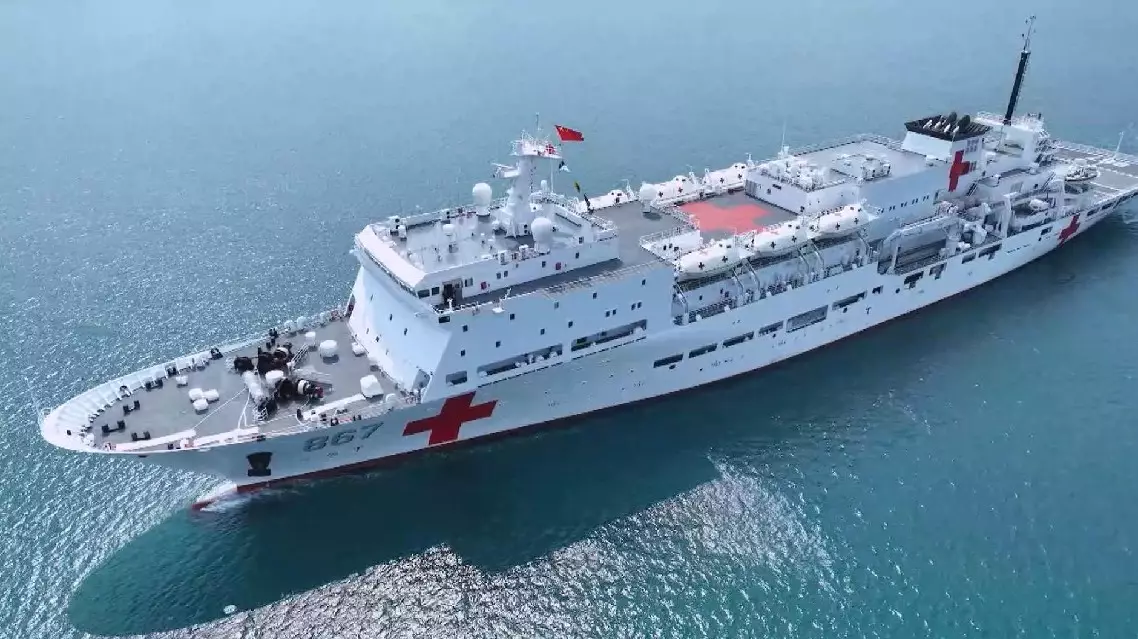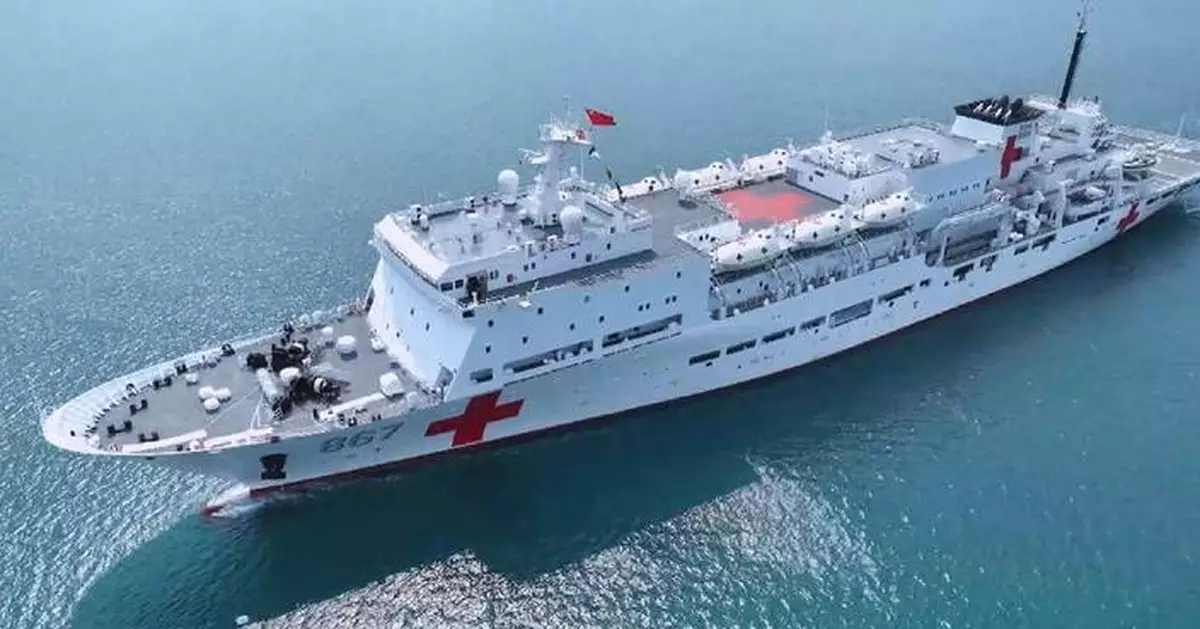China's "Silk Road Ark" hospital ship left Zhanjiang port in south China's Guangdong Province on Wednesday on a medical mission to provide care to Chinese soldiers stationed on islands in the South China Sea.
The ship has 14 clinical departments including orthopedics, general surgery, dermatology and gastroenterology.
"After receiving the order, we took the initiative to meet the needs of front-line officers and soldiers, planned in advance, and made full preparations for supplies and procedures. All members of our medical team will treat officers and soldiers on the islands with superb technology and quality service, helping them to stay healthy," said Pu Yanhua, a medic with the Southern Theater Command First Naval Hospital.
The Silk Road Ark, China's second domestically designed and built ocean-going hospital ship in the 10,000 ton class, provides medical aid and transfer for those injured at sea, visits residents and soldiers on China's islands and carries out international humanitarian medical services, as well as conducting foreign military medical exchanges and cooperation.
"As a hospital ship, it is very maneuverable and can get to an affected area quickly to provide medical assistance services. It also has transfer capabilities through various means. When operating in areas with no ports, medics and medical supplies can be transferred ashore by helicopter and ambulance boat," said Luo Jixing, a sailor aboard the "Silk Road Ark".
"As a large ocean-going hospital ship, it will not only provide reliable medical security, but also be a strong spiritual pillar for the Chinese Navy and its sailors to travel further across the ocean," said Li Xiao, another sailor aboard the "Silk Road Ark".

China's "Silk Road Ark" hospital ship sails to islands in South China Sea to treat soldiers
An amputee Palestinian journalist remains dedicated to uncovering and sharing the truth about life in the war-torn Gaza Strip, despite losing a limb after being targeted by an Israeli sniper.
Hazem Salman, a 27-year-old Palestinian journalist from Rafah, is currently displaced and lives in Khan Younis. He’s a freelance journalist who has spent the past 18 months documenting scenes of devastation and highlighting the dire humanitarian crisis unfolding in Gaza.
His reporting blurred the line between observer and participant, as the dangers he documented have become part of his own story.
"On July 3, 2018, I was injured on the eastern border of Gaza City, specifically east of the Shuja'iyya neighborhood, by an Israeli sniper. That targeting did not weaken me, it only strengthened my resolve and determination to continue conveying the truth and the reality on the ground. Even if I am targeted again, I have already lost my leg for the sake of journalism, to bring the image, truth, and suffering from the heart of Gaza, so the world knows Gaza is facing genocide," said Salman.
Salman's personal ordeal is not an isolated case but part of a broader pattern of threats faced by journalists in Gaza, where the line between reporting and endangerment grows increasingly thin.
"Every time I hear a drone at night, or the sound of helicopters or quadcopters, I feel as if the moment has come, that I could be targeted just like my fellow journalists. The targeting of journalists is a systematic policy by the Israeli occupation to erase the image and bury the truth. But I, along with my fellow journalists, remain committed to this mission, to the path of the martyrs and their sacrifices, until the very last day, even if we are all targeted," he said.
That commitment to truth-telling drives his actions on the ground, even amid constant danger and immense physical challenges.
"I follow events closely and head to strike sites on my bicycle to report the truth and deliver the image, despite the difficulties of moving around on a bike under current conditions. Streets are destroyed. Residential areas are devastated. And I face many obstacles while getting around. Sometimes, the targeted location is three or four kilometers away, and its exhausting to reach it because I'm on a bike," said Salman.
Beyond the field, the weight of responsibility doesn’t ease. Salman returns from documenting destruction to face the daily demands of life in the enclave, where his role as a journalist is matched by his role as a sole provider.
"As for my family situation, I am the only one they can rely on. I try to balance family life with journalism under extremely difficult circumstances. When I'm out working, there is no one to take my place in doing household tasks, fetching water, and buying things from the market. If the tarp gets torn, I have to fix it. If a wire gets damaged, I have to repair it. Even when I'm late, they can't switch the batteries for the lighting at night. They know I'm the one responsible for that, and I must be there. My family depends on me for many things," he said.
Despite the heavy responsibilities, he strives to bring moments of normalcy and comfort to his family amid the chaos surrounding them.
"I try to ease their burden however I can. I show the children videos from 'Toyor Al-Janah' or let them play games to distract them from the atmosphere of war and the sounds of bombing. A child should remember that their father, or their family, gave them something filled with hope, warmth, and a comforting embrace. That's what I try to provide in these difficult times, between the work of journalism and the demands of daily life," said Salman.

Amputee Palestinian journalist defies odds to expose Gaza’s reality





















































